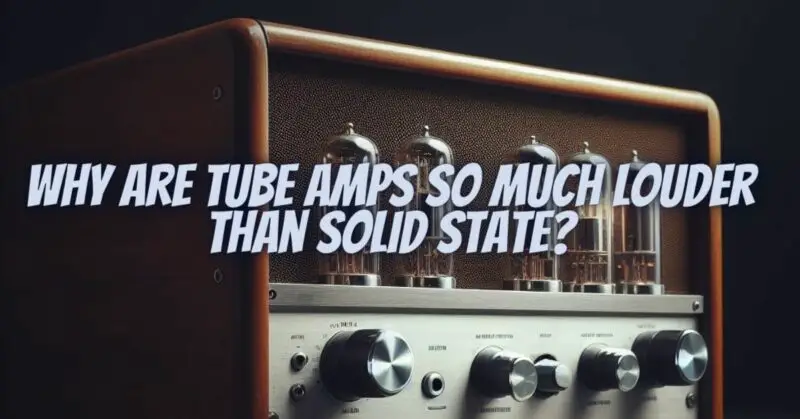Tube amps are often perceived as being louder than solid state amps of the same wattage. There are a few reasons for this:
- Tube amps are more efficient at converting electrical power into sound. This means that they can produce a higher sound pressure level (SPL) for the same amount of electrical power.
- Tube amps have a more gradual onset of clipping. Clipping is a type of distortion that occurs when the amplifier is overloaded. Solid state amps clip abruptly, which can produce a harsh and unpleasant sound. Tube amps clip more gradually, which produces a smoother and more natural-sounding distortion.
- Tube amps have a higher harmonic content. Harmonics are overtones that are produced when the amplifier distorts the signal. Harmonics add richness and complexity to the sound. Solid state amps have a lower harmonic content than tube amps, which can make their sound sound thinner and less complex.
In addition to these factors, tube amps are also often perceived as being louder because they have a more aggressive sound. This is due to the fact that tube amps produce more distortion than solid state amps. Distortion adds punch and presence to the sound, which can make it seem louder.
It is important to note that the perceived loudness of an amplifier is not only determined by its wattage. Other factors, such as the speaker efficiency, room acoustics, and the listener’s own perception of loudness, can also play a role.
Here is a more detailed explanation of each of the factors mentioned above:
Efficiency
Efficiency is a measure of how much electrical power an amplifier converts into sound power. Tube amps are generally more efficient than solid state amps. This means that they can produce a higher SPL for the same amount of electrical power.
Clipping
Clipping is a type of distortion that occurs when the amplifier is overloaded. When the amplifier is overloaded, the output signal is flattened and all of the peaks are clipped off. This can produce a harsh and unpleasant sound.
Solid state amps clip abruptly, meaning that the output signal goes from clean to distorted very suddenly. Tube amps clip more gradually, meaning that the output signal transitions from clean to distorted more smoothly. This produces a smoother and more natural-sounding distortion.
Harmonic content
Harmonics are overtones that are produced when the amplifier distorts the signal. Harmonics add richness and complexity to the sound. Solid state amps have a lower harmonic content than tube amps, which can make their sound sound thinner and less complex.
Tube amps produce more distortion than solid state amps, and this distortion contains more harmonics. This is why tube amps are often perceived as having a richer and more complex sound.
Aggressive sound
Tube amps are often perceived as having a more aggressive sound than solid state amps. This is due to the fact that tube amps produce more distortion. Distortion adds punch and presence to the sound, which can make it seem louder.
There are a number of reasons why tube amps are often perceived as being louder than solid state amps. Tube amps are more efficient at converting electrical power into sound, they have a more gradual onset of clipping, and they have a higher harmonic content. These factors all contribute to the richer, more complex, and more aggressive sound that tube amps are known for.


